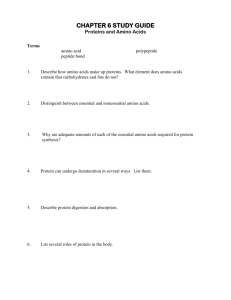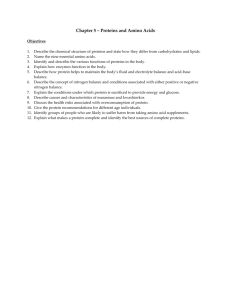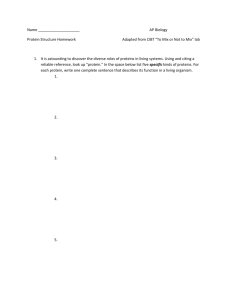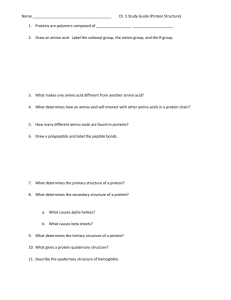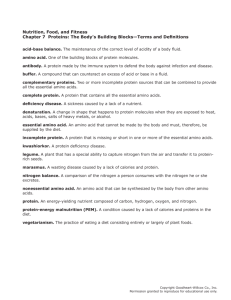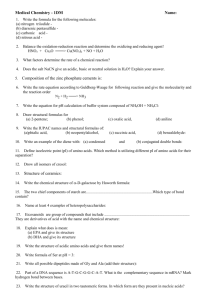HES 2823 Introductory to Nutrition – Knehans: EXAM 2 Questions
advertisement
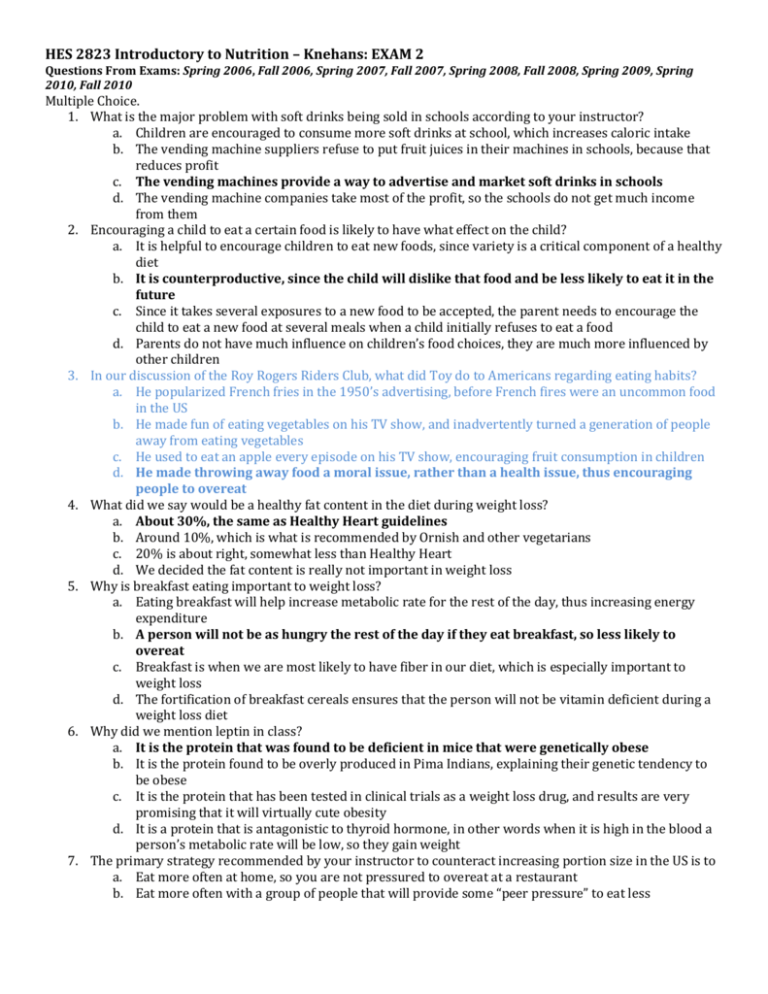
HES 2823 Introductory to Nutrition – Knehans: EXAM 2 Questions From Exams: Spring 2006, Fall 2006, Spring 2007, Fall 2007, Spring 2008, Fall 2008, Spring 2009, Spring 2010, Fall 2010 Multiple Choice. 1. What is the major problem with soft drinks being sold in schools according to your instructor? a. Children are encouraged to consume more soft drinks at school, which increases caloric intake b. The vending machine suppliers refuse to put fruit juices in their machines in schools, because that reduces profit c. The vending machines provide a way to advertise and market soft drinks in schools d. The vending machine companies take most of the profit, so the schools do not get much income from them 2. Encouraging a child to eat a certain food is likely to have what effect on the child? a. It is helpful to encourage children to eat new foods, since variety is a critical component of a healthy diet b. It is counterproductive, since the child will dislike that food and be less likely to eat it in the future c. Since it takes several exposures to a new food to be accepted, the parent needs to encourage the child to eat a new food at several meals when a child initially refuses to eat a food d. Parents do not have much influence on children’s food choices, they are much more influenced by other children 3. In our discussion of the Roy Rogers Riders Club, what did Toy do to Americans regarding eating habits? a. He popularized French fries in the 1950’s advertising, before French fires were an uncommon food in the US b. He made fun of eating vegetables on his TV show, and inadvertently turned a generation of people away from eating vegetables c. He used to eat an apple every episode on his TV show, encouraging fruit consumption in children d. He made throwing away food a moral issue, rather than a health issue, thus encouraging people to overeat 4. What did we say would be a healthy fat content in the diet during weight loss? a. About 30%, the same as Healthy Heart guidelines b. Around 10%, which is what is recommended by Ornish and other vegetarians c. 20% is about right, somewhat less than Healthy Heart d. We decided the fat content is really not important in weight loss 5. Why is breakfast eating important to weight loss? a. Eating breakfast will help increase metabolic rate for the rest of the day, thus increasing energy expenditure b. A person will not be as hungry the rest of the day if they eat breakfast, so less likely to overeat c. Breakfast is when we are most likely to have fiber in our diet, which is especially important to weight loss d. The fortification of breakfast cereals ensures that the person will not be vitamin deficient during a weight loss diet 6. Why did we mention leptin in class? a. It is the protein that was found to be deficient in mice that were genetically obese b. It is the protein found to be overly produced in Pima Indians, explaining their genetic tendency to be obese c. It is the protein that has been tested in clinical trials as a weight loss drug, and results are very promising that it will virtually cute obesity d. It is a protein that is antagonistic to thyroid hormone, in other words when it is high in the blood a person’s metabolic rate will be low, so they gain weight 7. The primary strategy recommended by your instructor to counteract increasing portion size in the US is to a. Eat more often at home, so you are not pressured to overeat at a restaurant b. Eat more often with a group of people that will provide some “peer pressure” to eat less HES 2823 Introductory to Nutrition – Knehans: EXAM 2 Questions From Exams: Spring 2006, Fall 2006, Spring 2007, Fall 2007, Spring 2008, Fall 2008, Spring 2009, Spring 2010, Fall 2010 8. 9. 10. 11. 12. 13. 14. 15. c. Use more prepackaged foods that have portions already measured, so you don’t have to estimate portions d. Throw food away even though it wastes money Which of the following combinations of food is a good example of complementary proteins to meet essential amino acid needs? a. Peanut butter and jelly sandwich b. Lima beans and lentils c. Pasta and cornbread d. Red beans and rice Which of the following statements best describes how our body reacts to starvation? a. The body breaks down its own proteins, first breaking down proteins in muscle, then progressing to break down proteins in vital organs like heart and liver later as starvation continues b. The body breaks down its own proteins, giving no priority to tissues such as heart or liver over muscle c. There is a specific storage protein, found in the liver, which will be broken down initially before other proteins are broken down d. There is a special area of the cell, called the amino acid pool, where amino acids are temporarily stored, these will be depleted first before any body proteins are broken down What best describes your instructor’s impression of protein supplements for muscle gain? a. If they are helpful, it is probably because they provide extra calories, not protein b. They are a helpful dietary supplement for most of those who wish to gain muscle c. They are a good value for your dollar in getting additional protein in your diet d. Most people who take them will suffer permanent kidney damage and suffer long-term health problems from taking them Which of the following strategies did your instructor feel would be successful in a weight management program? a. Emphasizing fruits and vegetables in your diet b. Drinking 1 full glass of water before your meal following the Adkins diet, as it recently was found very effective for weight loss c. Following the Adkins diet, as it recently was found very effective for weight loss d. Skipping lunch To stay in good health, we would like to stay below what body mass index? a. 15 b. 20 c. 25 d. 35 The incidence of overweight and obesity in the U.S. is now estimated at about ____% of the adult population. a. 20 b. 35 c. 50 d. 65 About how many kcalories are in one pound of fat? a. 2000 b. 2500 c. 3500 d. 4000 Why do we see an increase in BMR with overeating? a. Increase in insulin secretion b. Increase in glucagon secretion c. Decrease in adrenaline secretion d. Increase in thyroid hormone secretion HES 2823 Introductory to Nutrition – Knehans: EXAM 2 Questions From Exams: Spring 2006, Fall 2006, Spring 2007, Fall 2007, Spring 2008, Fall 2008, Spring 2009, Spring 2010, Fall 2010 16. Urea is filtered from the blood by the _____________. a. Kidney b. Blood c. Liver d. Brain 17. Define a limiting amino acid. a. A protein that does not provide adequate amounts of all essential amino acids b. The essential amino acid in an incomplete protein that limits protein synthesis c. A nonessential amino acid that is the least provided compared to needs d. The protein found in beans and grains 18. Which of the following would be a vegetarian (eats no animal products) want to avoid based on class discussion? a. Jello (gelatin) b. Thousand Island Dressing c. Cool Whip d. Shortening 19. When is conversion of amino acids to glucose important? a. Wherever excessive protein is consumed b. During starvation c. When consuming a weight loss diet high in carbohydrate d. Wherever needs for protein synthesis have been met 20. Which of the following is NOT going to influence the thermic affect of food? a. Digestion b. Absorption c. Transport of nutrients d. Body size 21. What is the source of amino acids for the amino acid pool when the diet is devoid of protein? a. All amino acids are synthesized from glucose b. Many, but not all, amino acids can be synthesized from fatty acids when protein is deficient c. Amino acid stores in the liver are mobilized to replenish the pool d. Body proteins are broken down to release amino acids for the pool 22. The caloric content of alcohol is _____ kcal/g. a. 4 b. 5 c. 7 d. 9 23. If a food contains 4 grams of protein and 160 kcalories, what is the % protein in this food? a. 5 b. 10 c. 15 d. 25 24. We discussed that the NCAA has what regulations regarding creatine? a. It allows universities to purchase it for athletes b. It is banned as a performance enhancer c. It can be purchased by athletes and taken, but universities cannot provide it, called nonpermissible d. The use of creatine is currently under review by the NCAA, but there is not restriction at this time 25. Which of the following is the limiting amino acid in legumes like pinto beans? a. Lysine b. Phenylalanine c. Methionine HES 2823 Introductory to Nutrition – Knehans: EXAM 2 Questions From Exams: Spring 2006, Fall 2006, Spring 2007, Fall 2007, Spring 2008, Fall 2008, Spring 2009, Spring 2010, Fall 2010 d. Glycine 26. Deamination of amino acids occurs a. When amino acids are needed for protein synthesis b. When amino acids are consumed in excess of need c. When a nonessential amino acid is consumed d. When a person is in positive nitrogen balance 27. Which of the following foods would have the highest net protein utilization? a. Whole wheat b. Whole milk c. Soy beans d. Eggs 28. Wheat, which are part of the grains grouping of complementary proteins, is limiting in ___________. a. Phenylalanine b. Methionine c. Cysteine d. Lysine 29. Which of the following is NOT true? a. BMR increases with overeating b. Females generally have a lower BMI than males c. BMR usually increases as you get older d. BMR is higher in someone with a high lean body mass 30. If a healthy adult eats excess protein a. Protein synthesis will be stimulated b. Nitrogen will be retained c. Net protein utilization will be altered d. Nitrogen balance will be maintained 31. The “Snackwell Syndrome” is caused by a. A craving for sweet taste due to the high sugar content of the cookies b. Consumers thinking that carbohydrates cause weight gain, so develop a phobia (fear) of eating cookies and other sweets c. The fat content of cookies is especially likely to lead to weight gain, so eating cookies and other sweets is likely to lead to overweight d. Consumers thinking that any low fat food item is low calorie, so they overeat that item 32. Which of the following sites of fat storage is most associated with an increase in heart disease risk? a. Hips/buttocks b. Chest c. Abdomen d. Neck 33. Nonexercise activity has been found to be important because of which of the following? a. New techniques allow for accurate measurement of this component, and this has given people better insight into their overall energy balance b. New weight loss programs have found this component of overall energy expenditure to be very important to encourage with clients to cause weight loss c. Our ability to respond to overeating by increasing this component, thus preventing weight gain d. It was recently discovered that this component is the largest component of energy expenditure, and therefore is critical to overall energy balance 34. For the following items, rank the energy density from most dense to least dense: 1) corn oil, 2) water, 3) pretzel, 4) apple a. 2,4,3,1 b. 4,2,3,1 HES 2823 Introductory to Nutrition – Knehans: EXAM 2 Questions From Exams: Spring 2006, Fall 2006, Spring 2007, Fall 2007, Spring 2008, Fall 2008, Spring 2009, Spring 2010, Fall 2010 35. 36. 37. 38. 39. 40. 41. 42. 43. c. 1,3,4,2 d. 3,1,4,2 Obesity rates have soared the past 10 years in the US. The most critical issue, according to your instructor, explaining this increase, is which of the following factors? a. A reduction in breast feeding b. People are not eating breakfast as often c. Portion sizes have increased d. TV watching has increased How did we define body mass index? a. Ht in inches/Wt in pounds b. Wt in pounds/(Ht in inches)2 c. Ht in meters/Wt in kilograms d. Wt in kilograms/(Ht in meters)2 Which of the following diseases did we discuss DOES NOT HAVE a clear link to obesity? a. Prostate cancer b. Lung cancer c. Heart disease d. Breast cancer How did we suggest you determine a reasonable caloric intake for weight loss? a. Take the intake that would maintain your weight and subtract 500/kcal from that b. Just stick with 1200 kcal, which is a minimum that anyone will lose weight consuming c. Just take your printout of the Food Guide Pyramid from assignment 1, that is likely a caloric intake that you will lose weight d. Begin with 2000 kcal, and subtract from that 25 kcal for every pound you would like to lose Recent evidence suggests that exercise is especially important during which phase of weight loss? a. The initial rapid weight loss phase b. The second, slower phase of weight loss c. The maintenance phase of weight loss, to prevent weight regain d. After significant regain of lost weight it is critical to losing that regained weight Which of the following assessment techniques did your instructor feel was easiest and cheapest to use, but not the most accurate to use? a. Skinfold thickness b. Underwater weighing c. Dual energy x-ray absorptiometry d. Bioelectrical impedence How did we define the set point for weight in class? a. The body weight that we defined against change b. The weight where we would have minimal health risk, our target weight c. The weight that we achieve in early adult hood (early 20’s) that we should maintain the rest of our life d. The weight that causes us to crave food, so need to stay above that weight during weight loss What is the leading cause of diabetes, especially Type 2, in the U.S.? a. Protein excess b. High carbohydrate diets c. High fat diets d. Obesity What is usually the major factor that explains variability in the kcal needs of two healthy men of similar age and size? a. Type of diet consumed b. Level of caloric consumption c. Thyroid hormone status HES 2823 Introductory to Nutrition – Knehans: EXAM 2 Questions From Exams: Spring 2006, Fall 2006, Spring 2007, Fall 2007, Spring 2008, Fall 2008, Spring 2009, Spring 2010, Fall 2010 d. Physical activity level Given the circumstances described for the next three questions, predict which of the following outcomes would be most likely to occur. 44. A person has not eaten anything for a week a. Body proteins are broken down to replenish amino acid pool b. Amino acids are deaminated and stored as fat c. Amino acids are utilized for meeting all needs for protein syntheses d. Nitrogen balance is maintained since excretion of protein is stopped 45. A person is consuming a vegetarian diet with rice as the only protein source a. Proteins are synthesized, but limiting amino acid has been substituted for b. Essential amino acids are stored in the amino acid pool awaiting complete protein consumption c. Body proteins are broken down to replenish the amino acid pool d. Amino acids are utilized for meeting all needs for protein synthesis 46. A person is consuming a diet that is excessive in kcal, providing 30% of kcal as protein a. Amino acids are deaminated and stored as fat b. Amino acids are utilized for meeting all needs for protein synthesis c. Essential amino acids are stored in the amino acid pool awaiting complete protein consumption d. Excess amino acids are stored in the amino acid pool to be used the next day for protein synthesis 47. Starch is a complex carbohydrate. If you consumed pure cornstarch from a box, what did we conclude? a. Corn starch would be preferable to sucrose because sucrose is a simple sugar b. Pure corn starch would have higher nutrient density than other pure carbohyrdrates, like table sugar, so would be preferable c. Because of their digestive properties, starch is always preferable to simple sugars d. As a low nutrient dense item, pure corn starch would be of no more value in the diet than sucrose 48. A core characteristic of all eating disorders is a. Binging b. Self-starvation c. It is a coping mechanism d. Dramatic weight loss 49. One health consequence of an eating disorder is a growth of downy hair on the body, which is most likely seen in someone with a. Anorexia nervosa b. Bulimia nervosa c. Binge-eating disorder d. Eating disorder not otherwise specified 50. Someone with anorexia nervosa is likely to have low bone density. Why is that likely? a. The low muscle strength puts no stress on the bones, so the bones breakdown b. The fat below the skin is gone, and that fat protects the bones c. The low calcium intake leads to bone loss d. Women stop menstruating and the lower estrogen causes a drop in bone density 51. Electrolyte (sodium and potassium) imbalances are most likely seen in a. Anorexia nervosa b. Bulimia nervosa c. Binge-eating disorder d. Eating disorder not otherwise specified 52. Of the following characteristics, which is common to all eating disorders? a. Denial of hunger b. Fainting c. Tooth decay d. Low self-esteem HES 2823 Introductory to Nutrition – Knehans: EXAM 2 Questions From Exams: Spring 2006, Fall 2006, Spring 2007, Fall 2007, Spring 2008, Fall 2008, Spring 2009, Spring 2010, Fall 2010 53. The difference between a nutritionist and a dietitian is a. Both can have only a bachelor’s degree in nutritional sciences, but the dietitian has passed a national exam b. Anyone can call themselves a nutritionist, with or without a degree, while a dietitian is a title protected by law c. There is no difference between the terms d. A dietitian has only a bachelor’s degree while a nutritionist has a master’s degree 54. Where is the only coordinated program (fastest route to registration) in the state of Oklahoma? a. OU Health Sciences Center b. University of Central Oklahoma c. Oklahoma State University d. East Central University 55. We are born to like what flavor? a. Sour b. Salty c. Bitter d. Astringent 56. Which of the following diseases did we discuss DOES NOT HAVE a clear link to obesity? a. Prostate cancer b. Lung cancer c. Heart disease d. Breast cancer 57. Which of the following is the limiting amino acid in tofu, a product made from soy beans? a. Lysine b. Phenylalanine c. Methionine d. Glycine 58. We discussed a popular diet solution in class that brags that it contains collagen, and because of that ingredient weight loss is high. We decided that collagen could actually be found in a less expensive food item, which is _________? a. Crisco b. Jello c. Pretzels d. Cream cheese 59. We know that kids are more obese if they watch more TV. What did we decide about the explanation for that? a. They are sedentary when they watch TV, so their energy expenditure is low b. The clear problem is macking on high calorie foods like candy while watching TV c. It is really a combination of things, including being sedentary and eating while watching TV d. They are influenced by food ads to eat more 60. What did your instructor conclude about fast food intake and obesity? a. The fast food industry encourages overeating by offering large portions b. There is no scientific evidence that eating more fast food leads to more obesity c. The cheaper the items at fast food tend to be those with the most calories, so people overeat d. The idea that you can lose weight on a fast food diet is really a farce, and is not recommended 61. About how many kcalories are needed to build one pound of muscle? a. 2000 b. 2500 c. 3000 d. 3500 62. Urea is synthesized in the _______________. HES 2823 Introductory to Nutrition – Knehans: EXAM 2 Questions From Exams: Spring 2006, Fall 2006, Spring 2007, Fall 2007, Spring 2008, Fall 2008, Spring 2009, Spring 2010, Fall 2010 63. 64. 65. 66. 67. 68. 69. 70. a. Kidney b. Blood c. Liver d. Brain What will result when someone takes thyroid hormone for weight loss? a. A long term increase in metabolic rate that will enhance weight loss efforts b. The thyroid gland will respond by decreasing output of hormone c. Blood pressure will increase d. There is actually an increase in weight due to water retention Based on class discussion, what was unique about the Pima Indians living in Arizona a. They developed a culturally-based weight loss program that has become a model for other groups b. An obese gene has been identified in this group that has helped better understand their obesity problem c. They are a very obese group in large part because of inactivity and a high fat diet d. Their ancestors passed on secrets to staying thin that they have now published in a diet book that has become very successful A protein with high net protein utilization is one which a. Has a high percentage of protein b. Has a limiting amino acid c. Has a high percentage of the protein consumed actually absorbed and enters the amino acid pool d. Has the essential amino acid composition that supports protein synthesis and is well digested. What is the major problem with soft drinks being marketed to children, according to your instructor? a. Children who consume more soft drinks weigh more b. Children are not really affected by marketing, so it is not a problem c. Parents have the primary responsibility for purchasing food and drink for children, so it is only a problem when parents are influenced by the marketing d. Soft drink consumption leads to vitamin deficiencies in children, which is now common in children in the US Which of the following protein functions did we decide was the highest priority for the body to maintain? a. Catalyze chemical reactions in the cell b. Fight infection c. Provide structure to lean tissues such as muscle d. Transport cholesterol and triglyceride in the blood As discussed in class, the grocery/packaged food industry has made it difficult for Americans to maintain a healthy weight primarily because of problems with a. Underpricing unhealthy high fat items to encourage their consumption b. Not providing fruits and vegetables in an appealing way c. Inadequate labeling of products so consumers are unable to make informed choices d. Low fat items are often high energy density and thus high in calories, such as Snackwell cookies How did we define body mass index? a. Ht in Inches/Wt in pounds b. Wt in Pounds/(Ht in inches)2 x 703 c. Ht in Meters/Wt in kilograms d. Wt in Kilograms/(Ht in meters)2 x 703 Tofu, which is made from soybeans, is limiting in ____________. a. Phenylalanine b. Methionine c. Cysteine d. Lysine HES 2823 Introductory to Nutrition – Knehans: EXAM 2 Questions From Exams: Spring 2006, Fall 2006, Spring 2007, Fall 2007, Spring 2008, Fall 2008, Spring 2009, Spring 2010, Fall 2010 71. Which of the following did we conclude would be a good food to incorporate into a weight loss program because it would have a low energy density? a. Pretzel b. Vegetable beef soup c. Chicken breast d. Bagels 72. What did we conclude about a parent helping children make healthy food choices? a. A parent should make healthy suggestions, like “eat your vegetables,” to assist children with decision making b. By allowing dessert items like cake at some meals, while making it clear that cake is not healthy for them c. Children need cleat instruction, so parents should not be ambiguous about explaining foods, but rather have a clear distinction that a child should eat healthy foods and not eat unhealthy foods d. A parent should make healthy food choices themselves to influence healthy choices by the child 73. Peanuts, which are part of the nuts and seeds grouping of complementary proteins, is limiting in____________. a. Phenylalanine b. Methionine c. Cysteine d. Lysine 74. Which of the following combinations of foods is a good example of complementary proteins to meet essential amino acid needs? a. Peanut butter and jelly sandwich b. Lima beans and lentils c. Black beans and cornbread d. Corn tortillas and rice 75. Which of the following combinations of foods is a good example of complementary proteins to meet essential amino acid needs? a. Peanut butter and jelly sandwich b. Navy beans and cornbread c. Lima beans and lentils d. Corn tortillas and rice 76. The main nitrogen-containing waste product in humans is a. Urea b. Creatine c. Uric acid d. Feces 77. Which of the following would have the highest energy density? a. Apple b. Pretzel c. Vegetable soup d. Broccoli 78. What is the advantage of consuming “live” enzymes in popular health products made from fruit juices? a. Live enzymes mean they are active, and they will help with digestion b. All enzymes in food are “dead,” or inactive, so the claim that a food contains live enzymes is a lie c. Live, or active, enzymes in food will be “killed,” digested/inactivated in the stomach, so no advantage d. Live enzymes contain a higher percentage of essential amino acids, so are higher quality 79. Which of the following is NOT an example of nonexercise activity? a. Walking to class b. Using stairs routinely at work HES 2823 Introductory to Nutrition – Knehans: EXAM 2 Questions From Exams: Spring 2006, Fall 2006, Spring 2007, Fall 2007, Spring 2008, Fall 2008, Spring 2009, Spring 2010, Fall 2010 80. 81. 82. 83. 84. 85. 86. 87. 88. c. Completing an aerobics class d. Washing your hair Which of the following is the limiting amino acid in pasta, a wheat product? a. Lysine b. Phenylalanine c. Methionine d. Glycine It is observed that those on a low-carbohydrate diet lose weight. What is the primary reason for this? a. Dieters consume less calories on a low-carb diet OR dieters will become temporarily dehydrated due to ketosis b. There is a “metabolic advantage”, in other words, since insulin levels are lower on low-carb diets, metabolism changes so that fewer calories are converted to fat c. Glycogen stores will be depleted in muscle because of the low carb diet, resulting in weight loss d. There is an increase in protein intake, which leads to greater thermic effect and thus increased energy expenditure How did we define overweight in children? Using the body mass index for age charts. a. Greater than 60th percentile b. Greater than 75th percentile c. Greater than 80th percentile d. Greater than 95th percentile Cleaning your plate became a well accepted cultural concept in the United States a. At the end of World War II when the USDA began to promote the idea b. At the beginning of the 20th century when food shortages in big cities were common c. During the depression era in the 1920s when starvation was common in the US d. When the food industry began promoting the idea in the 1970s to increase revenue Which of the following foods is likely about 35-40 fold lower in energy density than cream cheese, as discussed? a. Pretzels b. Fat free animal crackers c. Orange juice d. Snackwell cookies Negative nitrogen balance occurs when a. Nitrogen intake exceeds nitrogen excretion b. Nitrogen excretion increases over a 24 hour period of observation c. A protein is not well digested d. Nitrogen excretion in urine and feces is greater than nitrogen consumed in protein If someone were consuming bread as their only protein source, they would need to break down body proteins because a. Their diet would be deficient in an essential amino acid b. Bread does not contain enough g of protein to meet protein needs c. Bread does not contain enough calories to meet energy needs d. There are not enough nonessential amino acids in bread to meet our needs Which of the following parenting behaviors is likely to increase the LIKE for a food? a. Restricting access to a food b. Encouraging a child to eat a food c. Explaining the health benefits of a food d. Rewarding the child for eating that food Based on class discussion, the primary problem with eating fast food regarding obesity development is ________? a. Fast food is high energy dense b. Fast food tastes good to us, so we usually overeat it HES 2823 Introductory to Nutrition – Knehans: EXAM 2 Questions From Exams: Spring 2006, Fall 2006, Spring 2007, Fall 2007, Spring 2008, Fall 2008, Spring 2009, Spring 2010, Fall 2010 89. 90. 91. 92. 93. 94. 95. 96. 97. c. Fast food has been found to actually have some addictive properties, it stimulates the same parts of the brain that taking cocaine does d. We tend to overeat at fast food outlets since they give us large portions Which of the following behaviors did we conclude was especially important to incorporate into a weight loss program? a. Avoiding late night eating, as those calories are most likely stored as fat b. Eating breakfast to minimize hunger c. Restricting eating to only three meals a day, no snacking, so that overeating is less likely d. To et only at the dinner table and no where else in the house, such as in front of the TV Based on class discussion, what is the significant problem with drinking soft drinks? a. They cause a spike in blood glucose levels that cause an oversecretion of insulin b. The sweet taste leads to cravings for more sweet high calorie foods c. Consumption when you are thirsty confuses our appetite centers in the brain d. Consuming most low nutrient dense foods like soft drinks leads to overconsumption of calories What is the primary factor determining the food choices that people make? a. Taste of the food b. Price of the food c. Health benefits of the food d. Smell of the food Which of the following strategies did your instructor feel would be successful in a weight management program? a. Maintaining a variety of foods in your diet b. Drinking 1 full glass of water before your meal c. Cutting the fat content of the diet to about 10% of calories, well below heart association recommendations d. Skipping lunch About how many kcalories/d deficit should someone have for one week to lose one pound of fat? a. 250 b. 500 c. 750 d. 1000 Rule #7 of the Roy Rogers Club encourages children to a. Eat their vegetables b. Clean their plate c. Drink their milk d. Do whatever their parents tell them to do at the dinner table What is your instructor’s feelings about marketing food to children? a. He is angry about the situation b. He accepts that it is the American way c. He feels that parents are responsible, so marketing to children really has no impact on food choices d. He realizes that children are more influenced by what is eaten at home, so it does not concern him Which of the following assessment techniques did your instructor say is usually referred to as the “gold standard?” a. Skinfold thickness b. Underwater weighing c. Dual energy x-ray absorptiometry d. Bioelectrical independence If a healthy adult increases their protein intake from 15% of calories to 20% of calories a. Protein synthesis will be stimulated b. Nitrogen will be retained c. Net protein utilization will be altered HES 2823 Introductory to Nutrition – Knehans: EXAM 2 Questions From Exams: Spring 2006, Fall 2006, Spring 2007, Fall 2007, Spring 2008, Fall 2008, Spring 2009, Spring 2010, Fall 2010 d. Nitrogen balance will be maintained 98. What did we decide about breastfeeding? a. Breastfed infants are not as likely to be overweight, but adults who were breastfed are just as overweight as those not breastfed b. Breastfed infants are just as overweight as those not breastfed c. Because breast milk is high in cholesterol and fat, recent evidence suggests that breastfeeding increases risk of overweight in infancy 99. What was the primary reason your instructor felt it important to maintain variety in the diet during weight loss? a. That would make it likely that there would be no vitamin and mineral deficiencies b. It encourages people to consume less at any given meal c. It would require that they eat breakfast d. It would make it likely that the diet would be low in fat 100. Which of the following did we NOT list on the board as one of the five important features of successful weight loss programs? a. Group support b. Behavior modification c. Exercise d. Slow the rate of eating 101. Which of the following combinations of foods is a good example of complementary proteins to meet essential amino acid needs? a. Peanut butter and jelly sandwich b. Refried beans and corn tortillas c. Lima beans and lentils d. Pasta and cornbread 102. Deamination of amino acids occurs a. When amino acids are needed for protein synthesis b. When amino acids are consumed in a pill form as a dietary supplement c. When an amino acid is used as an energy source d. When a person is in positive nitrogen balance 103. In order to assess for overweight and obesity in children, we use BMI-for-age charts. What percentile defines obesity in children over the age of two? At or above the __________ percentile. a. 50th b. 70th c. 80th d. 95th 104. Which of the following foods would have the highest net protein utilization? a. Whole wheat bread b. Whole milk c. Soy beans d. Cornflakes Short answer. 1. We discussed why the popular high protein, low carbohydrate diets are likely to cause very rapid initial weight loss. Give me that explanation. a. “They cause dehydration” 2. We discussed reasons why breastfeeding might lead to less obesity later in life. Give me one explanation. a. “Children who were breastfed are exposed to many different flavors through breast milk. Since variety is a main component of the diet, breastfed babies have a lower risk of becoming obese” HES 2823 Introductory to Nutrition – Knehans: EXAM 2 Questions From Exams: Spring 2006, Fall 2006, Spring 2007, Fall 2007, Spring 2008, Fall 2008, Spring 2009, Spring 2010, Fall 2010 3. We discussed the Keys starvation study and described two primary observations regarding the effects of starvation, one physiological (effect on the body or on metabolism) and one psychological (how we think). Give me either one of these effects of starvation. a. “Physiological – BMR is lowered” b. “Psychological - person who is starving will become obsessed with food” 4. We listed a number of functions of protein on the board, such as hormones like insulin that regulate metabolism. Name (or describe) two other functions of our proteins in the body. a. “Makes up the muscles” b. “Fights infections in the body” 5. At what age (in years) did we recommend that trying to limit fat intake begin? In other words, at what age do we BEGIN to implement the Healthy Heart Guidelines, so as not to overly restrict caloric intake in a child? a. “2 years old” 6. We listed two tastes that we are born to like. Give me both of them. a. “Sweet” b. “Salty” 7. We listed two tastes that we are born to dislike. Give me both of them. a. “Sour” b. “Bitter” 8. When we drew the amino acid pool on the board, we listed three uses of amino acids (for example an amino acid being converted to another compound) that would require deamination. Give me one of those uses. a. “Glucose production if necessary, fat, energy expenditure” 9. We discussed several health problems that an obese person is at greater risk of developing (or dying from). Name one. a. “Heart disease” 10. We discussed that the NCAA has developed a nonpermissible list of supplements. Name one compound that we discussed in class that is on the nonpermissible list? a. “Creatine” 11. We gave two important benefits of exercise being included in a weight management program that specifically help a person lose weight by altering the energy balance equation. One is obvious; that you expend calories and therefore increase overall expenditure by doing exercise. What is the second benefit relevant to the energy balance equation? a. “Maintaining lean mass” 12. We discussed two tastes that we are born to like and two that we are born to dislike give me ONE taste that we are born to like and ONE taste that we are born to dislike. a. LIKE: “Sweet” b. DISLIKE: “Sour” 13. We diagramed the amino acid pool on the board many times. Diagram the amino acid pool, giving the two sources of amino acids for the pool and the four other ways that these amino acids are used. a.
